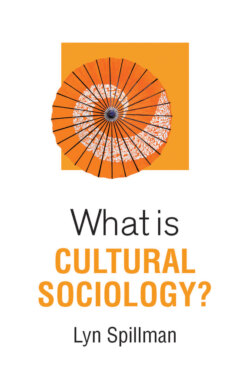Читать книгу What is Cultural Sociology? - Lyn Spillman - Страница 12
Conclusion
ОглавлениеHow can we learn to understand culture better? How can we learn more about shared assumptions we take for granted, cultural differences which puzzle us, cultural power which affects us despite ourselves, and cultural conflict which frequently erupts in society?
The first step is to develop a reflective orientation to the culture surrounding us. Attention to rituals, symbols, evaluations, norms, and categories sensitizes us as observers to meaning-making we might otherwise take for granted. We also need to understand the historical ambiguities of the concept of culture. Remembering that, historically, the idea of culture was used to label two quite different things – a separate realm of society, or a feature of entire groups – helps guard against unnecessary confusion. Beginning to think of culture as meaning-making process is a way to encompass both historical senses, as well as the enormous variety of meaning-making we see in the world.
Against this background orientation, the remaining chapters in this book offer an extended answer to the question “what is cultural sociology?” by explaining and demonstrating many of the conceptual tools cultural sociologists now use to help us understand meaning-making better. What do you need to know to do cultural sociology? Each chapter will offer a different angle of vision on cultural processes and illustrate different conceptual tools for understanding culture. The following chapter examines how and why cultural sociologists analyze cultural forms. Chapter 3 surveys the various ways cultural sociologists examine meaning in interaction. In chapter 4, we explore larger-scale processes of organized cultural production. Against this background, chapter 5 provides a summary overview, sketches a critical assessment of this book using the tools of cultural sociology, demonstrates debates and differences among cultural sociologists, and suggests how to begin to use the conceptual tools of cultural sociology. Throughout, we see contributions to many general political and economic topics central to sociologists, such as inequality, identity politics, social movements, and organizations. We also see contributions to our knowledge of specialized cultural products like the arts, popular culture, religion, and science.
Sociology has come a long way in understanding “the social construction of reality” since Berger and Luckmann coined the term in the sixties. Building on many interdisciplinary influences, as well as the sociological classics, sociologists stopped marginalizing the idea of culture, and cultural research and theory boomed. It is time for a stocktaking of what we have learned and how we now understand meaning and meaning-making processes. The following chapter discusses the biggest innovation in sociological understanding of culture: the analysis of cultural forms and their independent influence on meaning-making processes.
